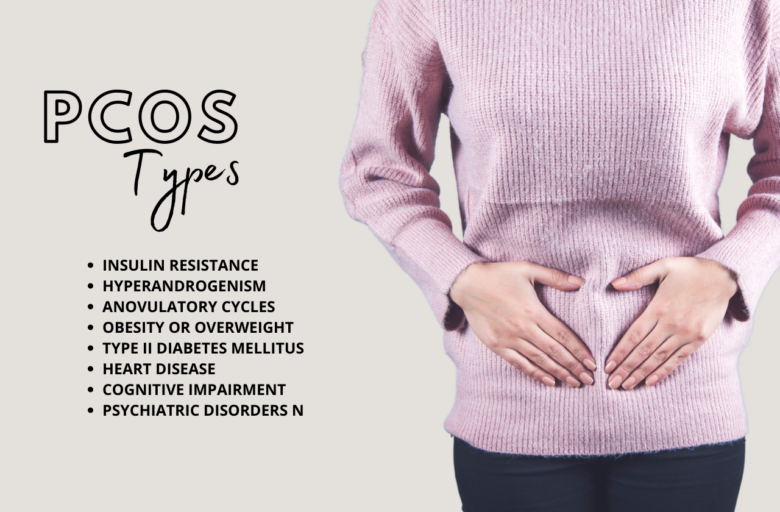Polycystic ovary syndrome (PCOS) is a common condition that affects about 10% of women of reproductive age. It’s marked by elevated levels of male hormones (androgens), which can lead to problems such as obesity, acne, and infertility.
This condition is also associated with comorbidities (PCOSCO), which are conditions that co-occur along with PCOS. These comorbidities can affect both the physical and psychological well-being of individuals with PCOS.
In this article, we will explore comorbidities in PCOS, specifically focusing on comorbidities related to fertility. We will discuss how acne and weight gain can impact fertility, as well as the role of polycystic ovaries in affecting other health conditions such as diabetes and heart health. Finally, we will offer some tips for managing comorbidities in PCOS.
Contents
What is polycystic ovary syndrome?
More than half a million women of reproductive age in the United States are living with PCOS, and it’s one of the most common endocrine disorders. It is characterized by enlarged, fluid-filled sacs on the ovaries called cysts that can cause infertility and other problems in women’s reproductive systems.

This disorder is often associated with other conditions, such as insulin resistance, obesity, and type 2 diabetes. These comorbid conditions are thought to play a role in PCOS development and severity.
This syndrome sometimes can be difficult to diagnose because it often mimics other health conditions. To determine whether you have it, your doctor will perform a physical exam and may order tests to check for hormonal abnormalities. If you have PCOS, your doctor may recommend treatments to improve your symptoms.
Signs and Symptoms
There are many signs and symptoms of PCOS, but some of the most common include irregular periods, infertility, weight gain, and acne. While there is no one-size-fits-all approach to treating PCOS, there are many treatments available that can help improve symptoms.
If you are experiencing any of the signs or symptoms of PCOS, it is important to consult with your doctor to determine if you have this condition and if there is anything you can do to improve your quality of life.
The Different Types of PCOS

There are a number of different types, each with its own set of comorbidities. Some common comorbidities include:
– Insulin resistance
– Hyperandrogenism (high levels of male hormones)
– Anovulatory cycles (lack of ovulation)
– Obesity or overweight
– Type II diabetes mellitus
– Heart disease
– Cognitive impairment
– Psychiatric disorders such as anxiety and depression
Comorbidities in PCOS
The syndrome is associated with an increased risk for developing other diseases, including diabetes, obesity, and heart disease.
The PCOSCO profile has not been well studied, but research suggests that there are a number of other health conditions that commonly co-occur with PCOS. These conditions include:
Obesity

It is one of the most common comorbidity. This is likely due to the fact that obesity is associated with an increased risk of developing type 2 diabetes and other chronic diseases, such as heart disease, stroke, and cancer.
Type 2 diabetes
Diabetes is another common comorbidity. This is because diabetes increases the risk of developing complications related to pregnancy, such as gestational diabetes and high blood pressure. Additionally, it can lead to insulin resistance, which is a major factor in the development of PCOS.
Gestational diabetes
It occurs in about half of women who develop polycystic ovary syndrome. Gestational diabetes usually disappears after childbirth but can occasionally lead to type II diabetes later on in life.
High blood pressure

Hypertension is also a common comorbidity in PCOS. This is due to the fact that hypertension increases your risk of developing cardiovascular disease, which is a leading cause of death in women. Additionally, hypertension can lead to other health problems like diabetes and obesity.
Diagnosing hypertension in women with PCOSCO can be difficult, as the symptoms may not appear until the condition is quite severe. Symptoms of hypertension in women with PCOS include:
- Heavy menstrual periods
- Nausea or vomiting
- Extreme tiredness
- A fast heart rate
- A build-up of fluid on the body (edema)
- If you are experiencing any of these symptoms, please see your doctor for a diagnosis and treatment plan.
Obstructive sleep apnea
Obstructive sleep apnea is a condition in which people stop breathing repeatedly during sleep, most often due to the collapse of the airway. This can lead to problems with weight gain, inflammation, and diabetes.
This condition is more common in women than men, and it’s also more common in people who have PCOS. People with PCOS often have higher levels of testosterone, which can contribute to the development of obstructive sleep apnea. The cause of obstruction in sleep apnea is usually the accumulation of tissue around the airway. This tissue can make it difficult for the air to flow freely through the airway, leading to recurrent stops and starts in breathing.
Depression or anxiety
Polycystic ovaries can cause weight gain, which in turn leads to increased levels of stress hormones. Women with PCOS also tend to be more anxious than women without the condition. This is likely due to the fact that PCOS can lead to infertility and difficulty regulating hormones. Women can also often experience mood swings, which can make them feel anxious or depressed.
Treatment Options

There is no one-size-fits-all approach to treating polycystic ovary syndrome, as the best treatment plan will vary depending on the individual’s symptoms and medical history. However, some common treatment options for PCOS include:
Birth control pills
The pill can help regulate menstrual cycles and reduce the number of eggs released by the ovaries. Combined oral contraceptives (COCs) containing ethinyl estradiol and norethindrone are most commonly used to treat PCOS. These drugs work by stopping ovulation, which may decrease the risk of developing ovarian cancer. Side effects of birth control pills may include mood changes, weight gain, and missed periods.
Weight loss
Weight loss is a critical part of treating PCOS because it can increase insulin sensitivity and reduce the amount of acne and other skin problems that are often associated with this condition. Gastric bypass surgery or other weight-loss surgery may be necessary in some cases. Dietary changes such as reducing sugar intake, eating fewer processed foods, and increasing fiber may also help to improve PCOS symptoms.
Metformin
Metformin is a type of medication used to treat diabetes mellitus and has been shown to be effective in reducing testosterone levels in women with PCOS. It can also lessen insulin resistance, which may improve blood sugar control in people with PCOS and reduce the risk of developing diabetes later in life. There are limited side effects associated with metformin, which typically include nausea, diarrhea, and lactic acidosis.

Prevention of PCOS
PCOS is a disorder that affects women of reproductive age. It’s a problem with the way your hormones work and can lead to problems like high blood pressure, obesity, and difficulty getting pregnant. There are plenty of things you can do to help keep your condition under control. Here are five tips for prevention:
1. Eat a balanced diet. Make sure you’re eating enough fruits and vegetables, whole grains, and lean protein sources.
2. Exercise regularly. Exercise not only helps you lose weight and improve your overall health, but it also helps to normalize your hormone levels and reduce the risk of developing PCOS.
3. Limit stress in your life. Too much stress can trigger fluctuations in your hormones, leading to PCOS symptoms. Take some time each day to relax and de-stress; this will help to regulate your body’s natural cycle.
4. Seek treatment for any medical conditions that might be contributing to PCOS symptoms. Conditions like thyroid disease or diabetes can impact hormone balance, which can lead to polycystic ovary sindrome development.
5. Keep a diary of your menstrual cycles for at least two years; this will help you track any changes in your symptoms and track any progress you make towards prevention.
FAQ
Does PCOS increase the risk of other diseases?
There is some evidence that PCOS increases the risk of developing other diseases. People with PCOS are more likely to have high blood pressure and insulin resistance, both of which are risk factors for type 2 diabetes and other long-term conditions. They also have a higher risk of ovarian cancer. However, there is not enough evidence to say for certain whether PCOS is actually responsible for these diseases or whether they are just associated with them.
What is the difference between PCOS and polycystic ovarian syndrome?
Unlike PCO, PCOS is a metabolic disorder associated with unbalanced hormone levels released by the ovaries.
Are there different stages of PCOS?
Insulin-resistant PCOS, post-pill PCOS (which is temporary), inflammatory PCOS, and adrenal PCOS are the four functional types of PCOS.
Does PCOS make you tired?
Yes, PCOS can make you tired. In fact, many women with PCOS report feeling chronically exhausted. The reason for this is complicated but involves the way that PCOS affects your hormones and your metabolism.
First of all, let’s understand what makes you tired. When you’re tired, your body is struggling to produce energy. This may be because your body isn’t getting the nutrients it needs or because it’s working harder than it should be.
Both of these reasons apply to women with PCOS. First of all, because of the hormonal imbalance caused by PCOS, many women have trouble regulating their periods and ovaries. This can lead to an overproduction of male hormones (like testosterone) and a relative lack of female hormones (like estrogen).
Second, because PCOS affects your metabolism, your body has a hard time using the energy it does produce effectively. This can lead to fatigue and other symptoms like weight gain or difficulty losing weight.
Conclusion
PCOSCO is a common endocrine condition that affects about 10 percent of women. It is characterized by enlarged ovaries and an imbalance in the production of male sex hormones.
The comorbidities section of this article provides a comprehensive overview of some of the most common comorbidities associated with PCOSCO, including obesity, diabetes, and chronic inflammation.
These conditions can worsen the symptoms of PCOS and make it more difficult to manage. If you are concerned about your health or want to know more about polycystic ovary syndrome, be sure to consult with your healthcare providers.
